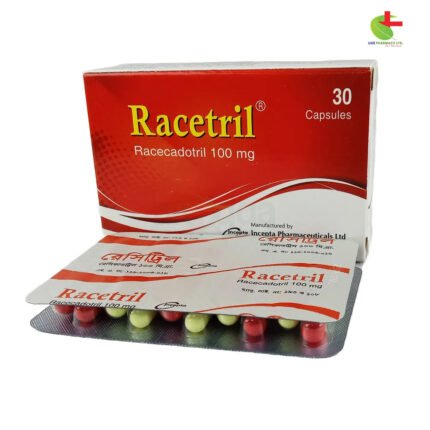Rasonix 20 Capsule
64.00৳ Strip
- Rasonix Gastro-Resistant Tablets are a proton pump inhibitor.
- Indicated for active duodenal and gastric ulcers, symptomatic GERD, and Zollinger-Ellison Syndrome.
- Effectively reduces gastric acid secretion to promote healing and manage symptoms.
- Dosages vary based on the condition, with specific guidelines for pediatric use.
- Always consult a healthcare provider for personalized treatment advice.
 Brand
Brand
|
Incepta Pharmaceuticals Ltd |
|---|---|
 Generics
Generics
|
Rabeprazole Sodium |
 Type
Type
|
Capsule |
Indications
Rasonix Gastro-Resistant Tablets are prescribed for the treatment of:
- Active duodenal ulcers
- Active benign gastric ulcers
- Symptomatic erosive or ulcerative gastro-esophageal reflux disease (GERD)
- Long-term management of gastro-esophageal reflux disease (GERD Maintenance)
- Symptomatic treatment for moderate to severe GERD
- Zollinger-Ellison Syndrome
- Eradication of Helicobacter pylori in conjunction with appropriate antibacterial therapies for patients with peptic ulcer disease.
Pharmacology
Rabeprazole effectively reduces gastric acid secretion by inhibiting the H+/K+-ATPase enzyme at the secretory surface of gastric parietal cells. This action classifies Rabeprazole as a proton pump inhibitor (PPI).
Dosage Recommendations
- Active Duodenal and Benign Gastric Ulcers:
- Recommended dose: 20 mg once daily in the morning.
- Healing typically occurs within four weeks for duodenal ulcers and six weeks for gastric ulcers, though some patients may require an additional four to six weeks.
- Erosive or Ulcerative GERD:
- Recommended dose: 20 mg once daily for 4 to 8 weeks.
- GERD Long-term Management:
- Maintenance dose of either 20 mg or 10 mg once daily, adjusted according to patient response.
- Moderate to Severe Symptomatic GERD:
- Recommended dose: 10 mg once daily for patients without esophagitis. If symptoms persist after four weeks, further evaluation is necessary.
- Pediatric Patients (Ages 1-11):
- For those under 15 kg: 5 mg once daily for 12 weeks (may increase to 10 mg if necessary).
- For those 15 kg or more: 10 mg once daily for 12 weeks.
- Zollinger-Ellison Syndrome:
- Initial dose: 60 mg once daily, adjustable to 120 mg/day based on individual needs. Doses above 100 mg may require division into two doses.
- Helicobacter pylori Eradication:
- Recommended regimen: 20 mg of Rabeprazole twice daily, combined with 500 mg clarithromycin and 1g amoxicillin, for 7 days.
Note: Always follow your registered healthcare provider’s advice when taking medication.
Administration
For optimal results, Rasonix should be taken in the morning before meals. Swallow the tablets whole; do not chew or crush them.
Interactions
Rasonix significantly inhibits gastric acid secretion, which may affect the absorption of pH-dependent medications. Co-administration with antifungal medications such as ketoconazole or itraconazole may decrease their effectiveness. No interactions were noted with liquid antacids, but avoid concurrent use with atazanavir due to pH dependency.
Contraindications
- Known hypersensitivity to Rabeprazole or any of its components.
- Not recommended during pregnancy or breastfeeding.
Side Effects
Rasonix is generally well-tolerated; however, some patients may experience headaches, diarrhea, abdominal pain, nausea, constipation, dry mouth, appetite changes, muscle pain, drowsiness, or dizziness.
Pregnancy & Lactation
Classified as FDA Category C. While animal studies show no adverse effects on fertility or fetal development, there are insufficient human studies. The decision to use Rabeprazole during breastfeeding should weigh the drug’s importance against the potential risks.
Precautions & Warnings
- Cancer Risk: Symptoms improvement does not rule out gastric or esophageal malignancy; appropriate evaluations are recommended.
- Long-term Use: Regular monitoring is advised for patients on extended therapy, particularly those treated for over a year.
- Fracture Risk: Prolonged use of PPIs may slightly elevate the risk of fractures, especially in the elderly. Patients should ensure adequate intake of calcium and vitamin D.
- Hypersensitivity Reactions: Be aware of potential cross-hypersensitivity with other PPIs.
- Administration Caution: Do not chew or crush the tablets.
- Blood Disorders: Reports of thrombocytopenia and neutropenia have been noted; these resolved upon discontinuation of Rabeprazole.
- Liver Function: Monitor liver enzyme levels as abnormalities have been reported.
Special Populations
- Renal and Hepatic Impairment: No dosage adjustments necessary.
- Pediatric Use: Safety and efficacy in children have not been established.
Overdose Effects
While the maximum exposure limits have not exceeded specified dosages, overdose effects are typically minimal and align with known side effects. Supportive care is recommended, as Rabeprazole is not dialyzable.
Therapeutic Class
Proton Pump Inhibitor
Storage Conditions
Store below 30°C, away from light and moisture. Keep out of reach of children.













Reviews
There are no reviews yet.